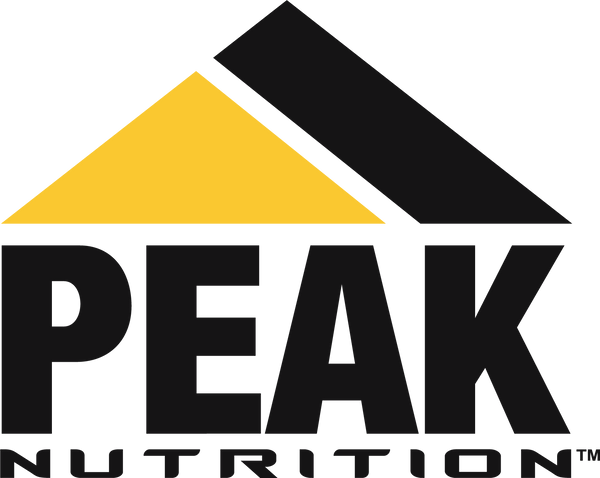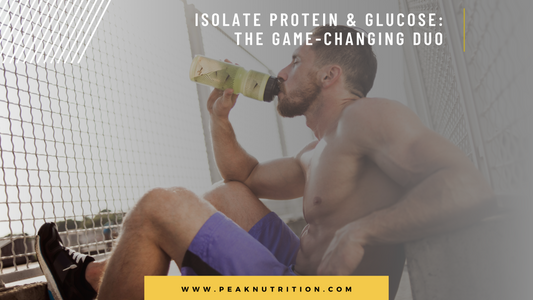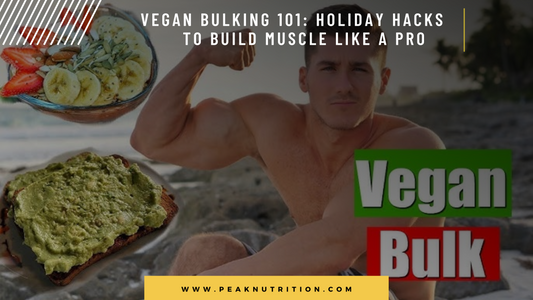"Biohacking Your Nutrition: Simple Tips for Better Health"
Share
In today's fast-paced world, maintaining optimal health and peak performance can be challenging. As the leading supplement wholesaler in Arizona, Peak Nutrition is dedicated to providing you with the knowledge and tools necessary to achieve your fitness goals. Biohacking, a term coined to describe the pursuit of achieving the best possible physical and mental state through strategic interventions, often involves dietary adjustments and supplementation. We'll start by discussing the hierarchy of needs in supplementation—highlighting the most critical supplements to consider. Then, we'll explore additional biohacking tips, supported by research, that you can incorporate to further optimize your health.
Multivitamin & Fish Oil


Why They're Essential
A high-quality multivitamin serves as a foundational supplement, ensuring that your body receives essential micronutrients that may be lacking in your diet. These vitamins and minerals support various bodily functions, including immune health, energy production, and cellular repair. Fish oil, rich in omega-3 fatty acids (EPA and DHA), is crucial for cardiovascular health, brain function, and reducing inflammation. Studies have shown that omega-3 fatty acids can lower the risk of chronic diseases such as heart disease and improve cognitive function.
Recommended Dosage
- Multivitamin: Follow the manufacturer’s recommended dosage, typically one to two capsules per day.
- Fish Oil: 1,000 to 2,000 mg of combined EPA and DHA per day.
Post-Workout Glucose & Isolate Protein

Why They're Essential
Post-workout nutrition is critical for muscle recovery and growth. Consuming glucose after exercise helps replenish glycogen stores, providing energy for muscle repair. Isolate protein, which is quickly absorbed, supplies the amino acids needed for muscle protein synthesis. Research indicates that consuming carbohydrates and protein together post-workout enhances glycogen replenishment and stimulates greater muscle protein synthesis compared to protein alone.
Recommended Dosage
- Glucose: 30-50 grams post-workout.
- Isolate Protein: 20-30 grams post-workout.
Sustained Protein

Why It's Essential
While isolate protein is ideal post-workout, sustained-release proteins like casein are beneficial throughout the day, especially before bed. Sustained-release proteins provide a steady supply of amino acids, promoting muscle protein synthesis and preventing muscle breakdown. Studies suggest that consuming sustained-release protein before sleep can enhance overnight muscle recovery and increase muscle mass over time.
Recommended Dosage
- Sustained Protein: 20-30 grams, preferably before bedtime.
Creatine

Why It's Essential
Creatine is one of the most researched and effective supplements for enhancing athletic performance. It increases the availability of ATP (adenosine triphosphate), the primary energy carrier in cells, thereby improving strength, power, and exercise performance. Research has consistently shown that creatine supplementation can enhance muscle strength, increase lean muscle mass, and improve overall exercise performance.
Recommended Dosage
- Creatine Monohydrate: 5 grams per day, ideally taken post-workout.
Biohacking Tips to Improve Health
In addition to the essential supplements outlined above, here are some biohacking tips supported by research to help you optimize your health:
Adaptogenic Mushrooms
Benefits and Research
Adaptogenic mushrooms, such as reishi, chaga, and lion’s mane, have been used in traditional medicine for centuries. These mushrooms help the body adapt to stress, improve immune function, and enhance cognitive performance. Research indicates that reishi mushrooms can boost immune function and reduce fatigue, while lion’s mane mushrooms have been shown to support brain health by promoting nerve growth factor (NGF) synthesis. Learn more here.
How to Use
- Reishi: 1,000-2,000 mg per day.
- Lion’s Mane: 500-1,000 mg per day.
Intermittent Fasting
Benefits and Research
Intermittent fasting (IF) involves cycling between periods of eating and fasting. This approach can improve metabolic health, enhance weight loss, and increase longevity. Studies have shown that intermittent fasting can reduce insulin resistance, decrease inflammation, and promote cellular repair processes such as autophagy.
How to Implement
- 16/8 Method: Fast for 16 hours and eat within an 8-hour window.
- 5:2 Diet: Eat normally for five days and restrict calories to 500-600 for two non-consecutive days.
Cold Exposure

Benefits and Research
Cold exposure, through activities such as cold showers or ice baths, can enhance physical and mental resilience. It activates brown fat, which increases calorie burning and improves metabolic health. Research has also shown that cold exposure can reduce inflammation and improve recovery after exercise.
How to Implement
- Cold Showers: Start with 30 seconds to 1 minute and gradually increase to 5-10 minutes.
- Ice Baths: 10-15 minutes at a temperature of 50-59°F (10-15°C).
Blue Light Blocking
Benefits and Research
Excessive exposure to blue light from screens can disrupt your circadian rhythm, leading to poor sleep quality. Blue light blocking glasses or screen filters can mitigate this effect, improving sleep and overall health. Research has demonstrated that reducing blue light exposure in the evening can enhance sleep quality and cognitive function.
How to Implement
- Blue Light Blocking Glasses: Wear in the evening, especially 2-3 hours before bedtime.
- Screen Filters: Install on electronic devices to reduce blue light emission.
Probiotics and Gut Health
Benefits and Research
Probiotics are beneficial bacteria that support a healthy gut microbiome, which is essential for digestion, immune function, and mental health. Research has shown that probiotics can improve digestive health, reduce symptoms of depression and anxiety, and enhance immune function.
Recommended Dosage
- Probiotics: 1-10 billion CFUs (colony-forming units) per day.
Mindfulness and Meditation

Benefits and Research
Mindfulness and meditation practices can reduce stress, improve mental clarity, and enhance overall well-being. Studies have shown that regular meditation can lower cortisol levels, decrease anxiety, and improve focus and attention.
How to Implement
- Meditation: Start with 5-10 minutes per day and gradually increase to 20-30 minutes.
- Mindfulness: Incorporate mindful breathing and awareness exercises throughout the day.
Hydration Optimization

Benefits and Research
Proper hydration is crucial for maintaining optimal health, cognitive function, and physical performance. Even mild dehydration can impair mood, energy levels, and cognitive function. Research suggests that adequate hydration improves physical performance, brain function, and overall well-being. Learn more here.
How to Implement
- Water Intake: Aim for 3-4 liters per day, more if engaging in intense physical activity.
- Electrolytes: Consider supplementing with electrolytes to maintain balance, especially during prolonged exercise.
Quality Sleep
Benefits and Research
Quality sleep is fundamental to overall health, affecting everything from cognitive function to immune health. Poor sleep is linked to numerous health issues, including obesity, heart disease, and depression. Research underscores the importance of sleep for memory consolidation, cellular repair, and hormonal balance.
How to Improve
- Sleep Hygiene: Establish a consistent sleep schedule, create a comfortable sleep environment, and avoid screens before bed.
- Supplements: Consider melatonin or magnesium to improve sleep quality.
Functional Movement and Mobility
Benefits and Research
Incorporating functional movement and mobility exercises into your routine can enhance physical performance and prevent injuries. These exercises improve flexibility, strength, and coordination. Research highlights that functional training can reduce the risk of injuries and enhance overall physical fitness.
How to Implement
- Mobility Exercises: Include dynamic stretches and mobility drills in your warm-up routine.
- Functional Training: Incorporate exercises like squats, lunges, and planks into your workout regimen.
Personalized Nutrition

Benefits and Research
Personalized nutrition involves tailoring your diet based on individual factors such as genetics, lifestyle, and health goals. This approach can optimize nutrient intake and improve overall health. Research suggests that personalized nutrition can lead to better dietary adherence and more significant health improvements compared to generalized dietary recommendations.
How to Implement
- Nutritional Assessments: Consider genetic testing and dietary assessments to tailor your nutrition plan.
- Dietary Adjustments: Work with a nutritionist to develop a personalized diet plan that meets your specific needs.
Conclusion
Biohacking your nutrition is a powerful strategy to enhance your health, performance, and overall well-being. By prioritizing the essential supplements—multivitamin, fish oil, post-workout glucose and isolate protein, sustained protein, and creatine—you can lay a strong foundation for your fitness goals. Incorporating additional biohacking tips, such as adaptogenic mushrooms, intermittent fasting, cold exposure, and personalized nutrition, can further optimize your health. At Peak Nutrition, we are committed to providing you with the highest quality supplements and the latest research to help you achieve your health and fitness goals. Whether you're an athlete, fitness enthusiast, or simply looking to improve your overall health, these biohacking strategies can empower you to take control of your well-being and reach new heights in your performance.





